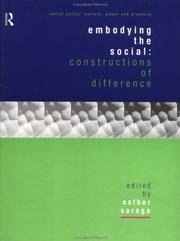| Listing 1 - 3 of 3 |
Sort by
|
Book
ISBN: 9402412964 9402412948 Year: 2018 Publisher: Dordrecht : Springer Netherlands : Imprint: Springer,
Abstract | Keywords | Export | Availability | Bookmark
 Loading...
Loading...Choose an application
- Reference Manager
- EndNote
- RefWorks (Direct export to RefWorks)
This book sets out to understand the significance of geographical context – place – for universities in the globalised setting of the twenty-first century. It examines their social impact on the regions in which they are situated, both from the perspectives of the universities themselves and from the perspectives of a range of different local and regional interest groups. It draws on a national study in the UK which has examined the role played by universities in four contrasting regional contexts. This UK study will be set within the larger theoretical and international literature on the role played by universities in processes of social change and transformation. An important theme of the book is the effects of university activities on various socially disadvantaged groups and consideration is given to whether there are ‘winners’ and ‘losers’ arising from the activities and interventions of universities. The book distinguishes between ‘discourses’, ‘activities’ and their ‘impacts’ in considering the role of universities and emphasises the importance of history and context as important mediators of national and institutional policies. It examines some of the key partnerships which universities enter into within their regions and considers some of the factors which determine the nature of these partnerships. Implications are drawn out for university leaderships and for regional and national policy bodies. The book provides empirical evidence in a field marked by a considerable amount of rhetoric from interested parties. One of the book’s conclusions is that there is considerable diversity among higher education institutions in how they perform a regional role, but it is a significant question for each of them. Institutional variation and regional setting come together to shape what is achievable.
Universities and colleges --- Sociological aspects. --- Education. --- Culture --- Educational policy. --- ducation and state. --- Higher education. --- Regional economics. --- Spatial economics. --- Higher Education. --- Regional and Cultural Studies. --- Educational Policy and Politics. --- Regional/Spatial Science. --- Study and teaching. --- Education, Higher. --- Culture-Study and teaching. --- Economics --- Regional planning --- Regionalism --- Space in economics --- College students --- Higher education --- Postsecondary education --- Education --- Culture—Study and teaching. --- Education and state. --- Spatial economics --- Regional economics --- Education policy --- Educational policy --- State and education --- Social policy --- Endowment of research --- Government policy
Book

ISBN: 128018664X 0203270312 0203007506 9780203270318 1134703880 Year: 1998 Publisher: London; New York : Routledge,
Abstract | Keywords | Export | Availability | Bookmark
 Loading...
Loading...Choose an application
- Reference Manager
- EndNote
- RefWorks (Direct export to RefWorks)
Rethinking the Region argues that regions are not simply bounded spaces on a map. This book uses unique research of England during the 1980's to show how regions are made and unmade by social processes. The book examines how new lines of division both social and geographical were laid down as free-market growth and reconstructed this are as a `neo-liberal' region. The authors argue that a more balanced form of growth is possible - within and between regions as well as between social groups. This book shows that to grasp the complexities of growth we must rethink `the region' in time as well as
Geography. --- Earth sciences. --- Geosciences --- Environmental sciences --- Physical sciences --- Cosmography --- Earth sciences --- World history

ISBN: 0415181313 0415181321 Year: 1998 Publisher: London Open University Press
Abstract | Keywords | Export | Availability | Bookmark
 Loading...
Loading...Choose an application
- Reference Manager
- EndNote
- RefWorks (Direct export to RefWorks)
Explores the problem of why we treat forms of social differences as if they were the consequences of biology. Treats difference as being produced by processes of social construction and addresses general questions about how to analyse these processes in relation to social differences, social problems, and social welfare. Also explores these in relation to patterns of social differentiation, using case studies of racialised differences, sexuality, and disability.
Nature and nurture --- Public welfare --- Social policy --- Social problems --- Sociology --- Philosophy
| Listing 1 - 3 of 3 |
Sort by
|

 Search
Search Feedback
Feedback About UniCat
About UniCat  Help
Help News
News